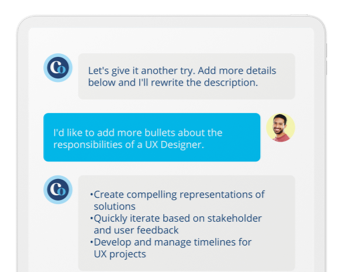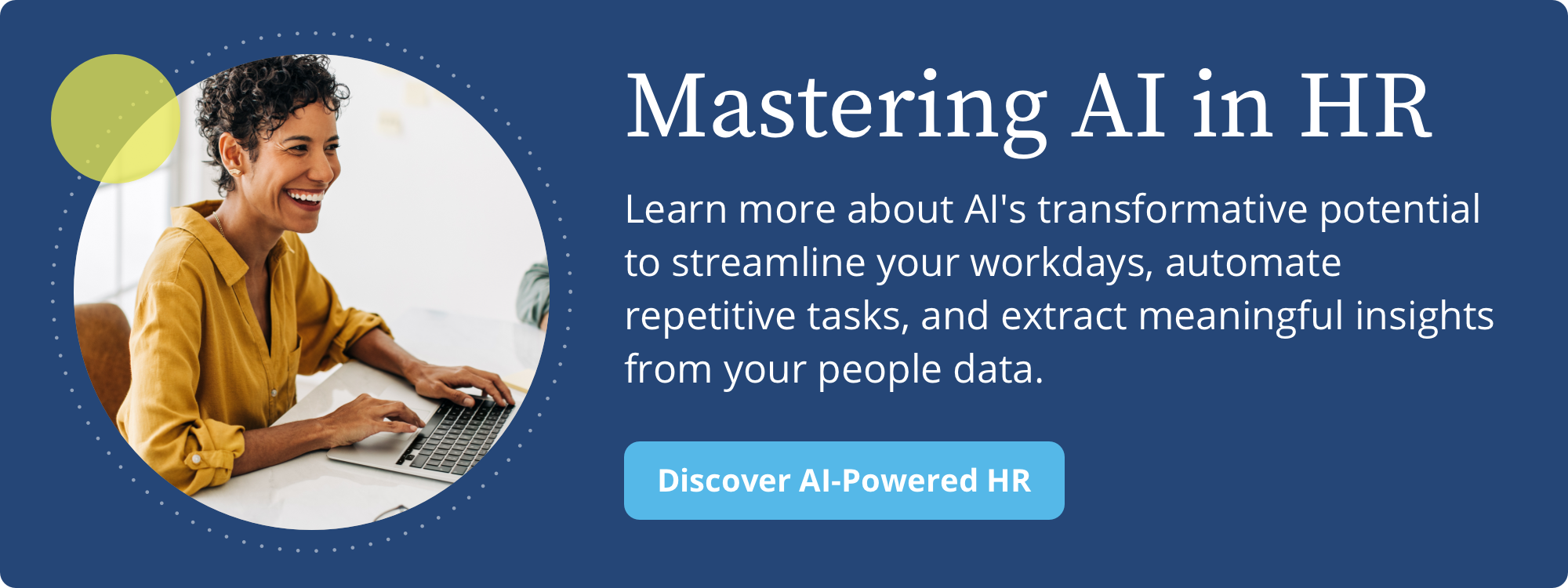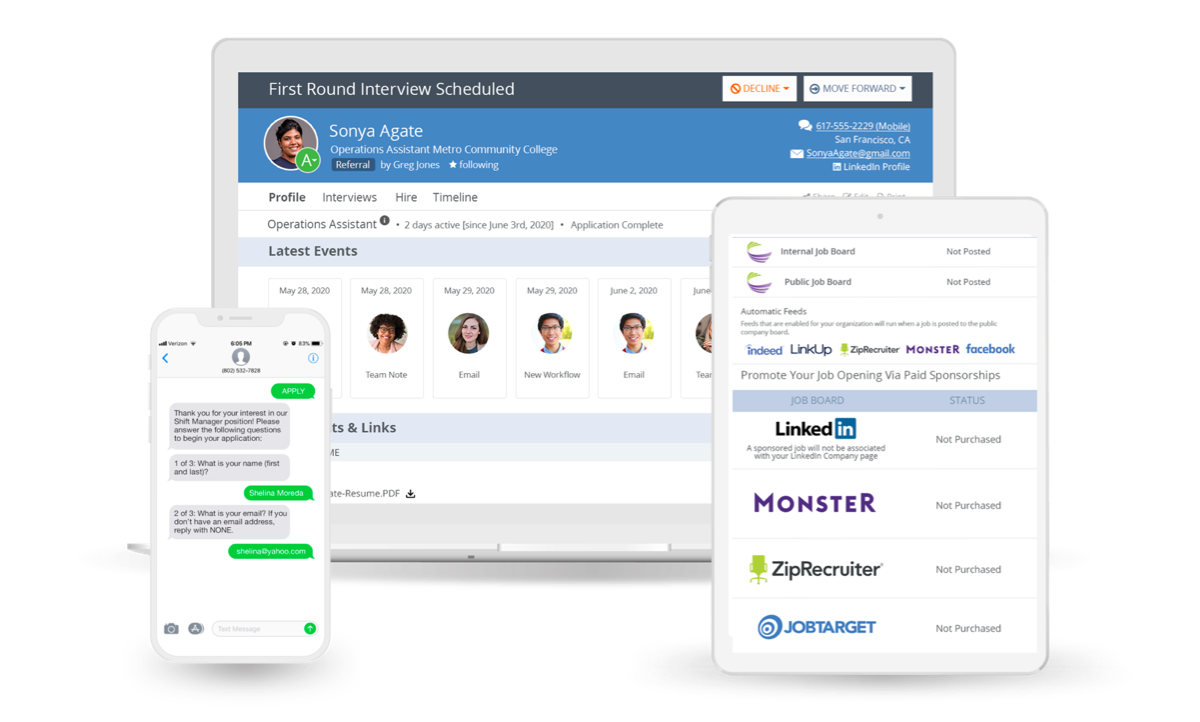Artificial intelligence (AI) is on everyone’s mind. And we mean everyone — 62% of Americans believe it will have a major impact on workers over the next 20 years. AI in HR and recruiting is no different, with around half of companies using it in their hiring process already. That figure is expected to reach almost 70% by the end of 2025.
AI technology is already making an impact in several areas of hiring, saving time for talent acquisition teams and increasing clarity for job candidates:
- 82% of companies use AI to help screen resumes.
- 40% say they use it for communicating with applicants.
- 64% use AI to evaluate tests and assignments completed by candidates.
Keep reading for eight ways your talent acquisition team can leverage HR automation and AI tools while sticking to AI best practices.
1. AI-Driven Candidate Sourcing and Matching
Candidate sourcing is a complex process of identifying individuals who may be a good fit for open roles in your organization. Then, you have to engage with them and attempt to get them interested in your company. Building a pool of candidates and getting in touch with all of them isn’t easy, but AI makes it much easier.
When you use an AI system for candidate sourcing, it pulls from a vast database of hundreds of millions of professionals instantly. It takes into account your job requirements and candidates’ skills and qualifications, along with their experience levels and location, if it’s relevant. Instead of scouring social media and searching for obscure job boards, your recruiters can focus on getting in touch with top candidates.
That’s something AI can help with, too. AI’s advanced algorithms rapidly analyze your talent pool to identify the candidates whose characteristics match your job requirements best. Your team is presented with a ranked list, prioritizing top talent based on how well they match the role’s must-haves and nice-to-haves.
With these AI tools, recruiters can spend their valuable time on what really drives hiring success: communicating and building relationships with candidates.
2. Chatbots Drive Hiring Speed
Engaging candidates quickly is key, and AI-powered chatbots are a familiar way to do that from the start of the recruiting process. You can leverage AI chatbots on your career site to direct job seekers to suitable open roles, answer common questions about the application process, and provide information about company culture. They can even perform simple candidate screenings and help applicants schedule interviews for some roles.
AI chatbots ensure consistent, helpful interactions whenever candidates visit your site. You can move them along the recruitment funnel without any involvement from your recruiters or HR professionals. That gives your applicants a solid start to the candidate experience and frees up recruiters’ time for more strategic tasks.
3. Advanced, AI-Powered Talent Analytics
Recruiting software equipped with AI-powered talent analytics offers your team — and HR leaders — a new level of understanding of your hiring process. It turns your data into real insights that tell you if your processes are effective and, if they’re not, how to change that.
With AI talent analytics, your team has the power to make data-driven decisions. Just ask questions and get real-time answers and data visualizations to guide your strategy. You’ll also have the tools you need to present said data easily and effectively. With custom dashboards and automatic report sharing, everyone can stay up-to-date and engaged.
4. Predictive Analytics for Talent Acquisition
As artificial intelligence advances, we’re getting closer to predicting the future. Predictive analytics analyzes past recruitment patterns, employee turnover rates, and market dynamics to forecast future hiring needs. Your HR team can stay ahead of the curve with this proactive approach — no more reactive recruitment. With predictive analytics, it's all about looking ahead and being prepared.
This AI-driven insight extends to candidates. Predictive analytics can determine the likelihood of a candidate accepting a job offer, which helps your recruiters tailor their strategies. It can even identify those most likely to be successful based on data from your best employees.
Embracing predictive analytics is more than a strategic move — it's a necessity for growth-minded companies. Teams with access to predictive insights are poised to find the right candidates at the right time, enhancing efficiency and elevating the entire talent acquisition process.
5. Diversity and Inclusion Enhancement
AI in hiring can greatly benefit your diversity, equity, inclusion, and belonging (DEIB) commitment. Unconscious biases, often unintentional and deeply ingrained, can influence hiring decisions. AI helps reduce bias by focusing solely on candidates’ skills, qualifications, and experience. 47% of Americans believe AI is better than humans at treating all applicants equally.
AI aids in increasing diversity by widening the talent pool. Its data-driven approach identifies candidates from diverse backgrounds who are often impacted by bias in manual reviews. AI can also help craft job descriptions that are more inclusive, removing gendered and jargon-heavy language that can alienate applicants.
It’s important to be selective with your AI software. The technology is built by people with biases, which means it’s susceptible to bias, too. Choose an ATS provider that’s committed to Responsible AI.
6. Streamlined Onboarding Process
The first days of a new job set the tone for the entire employee experience — 86% of employees agree onboarding is essential for their success. AI helps HR teams ensure those first days and weeks are smooth, efficient, and impactful with a streamlined onboarding process.
AI digitizes administrative tasks like paperwork, accelerating the manual, time-consuming aspects of onboarding. That lets your team focus on helping new hires get familiar with company culture. AI can provide personalized onboarding experiences, tailoring onboarding programs by analyzing employee profiles and preferences.
Your HR team can leverage AI-powered analytics to identify bottlenecks, measure engagement, and constantly collect new hire feedback to monitor and refine their onboarding processes.
Data Analytics Drives DEIB
The HR team at an insurance company used analytics to discover why they weren’t attracting a diverse candidate pool. They found that candidates of color were applying later in the posting cycle. The company now leaves job posts up for a minimum of two weeks before building candidate lists. As a result, their hiring rate for people of color now exceeds industry benchmarks.
7. New Hire Retention Strategies
Replacing employees is expensive, especially if you just spent money to hire them. AI can help you address new hire retention by analyzing as many data points as possible —like 30-, 60-, or 90-day reviews, onboarding engagement surveys, and external factors —to identify patterns. This way, your HR team can address concerning trends before they escalate.
AI equips HR to take a proactive, individualized stance in retaining newly hired talent. That results in higher job satisfaction, reduced turnover, and a workforce deeply committed to the organization's success.
8. Nonstop Learning and Development
AI can help you build learning paths for individual employees, which doubles as a retention strategy — investing in employee development can boost retention by as much as 58%. The technology uses employees’ skills, preferences, and career goals to recommend personalized development plans and growth opportunities.
AI helps ensure that employees engage with relevant content aligned with their goals. Unlike traditional one-size-fits-all approaches, tailored learning paths foster a culture of continuous improvement. That benefits your employer brand, which boosts your hiring process by helping you attract more qualified candidates who are interested in learning.
HR also uses AI to pinpoint skill gaps by analyzing data from performance evaluations and project outcomes. This insight helps HR make hiring plans and develop reskilling and upskilling programs that directly address organizational needs.
Employees reward companies that help them grow with loyalty and productivity. As the demand for new skills rises, now is the perfect time to invest in your employees to retain them long-term. Leverage AI to enable a culture of learning that’s closely aligned with individual aspirations and organizational goals and develop a more skilled, engaged, and motivated workforce.
Responsible AI in HR Use
It’s important to remember that 71% of people oppose employers using AI to make final hiring decisions. AI in hiring isn’t perfect, and companies are on the hook if their use of AI leads to discriminatory practices. Look for AI recruitment software with an ethics policy or Responsible AI commitment, and be transparent about your AI use.
When used responsibly, AI for recruiting and hiring enhances your team’s impact — it can’t replace human recruiters or any other HR employee. In fact, AI enables a more human-centered approach, and it can have a transformative effect on efficiency and productivity. With AI taking care of manual tasks and analyzing massive amounts of data, your team can spend more time building connections with candidates and employees.
AI-Powered Recruiting Software
Your team can leverage the power of artificial intelligence in HR software now with ClearInsights from ClearCompany. The AI-powered talent analytics sidekick is HR's strategic partner, transforming raw data into real insights.
Get a demo of ClearInsights, the first-of-its-kind HR analytics platform that will transform your approach to your talent data.



